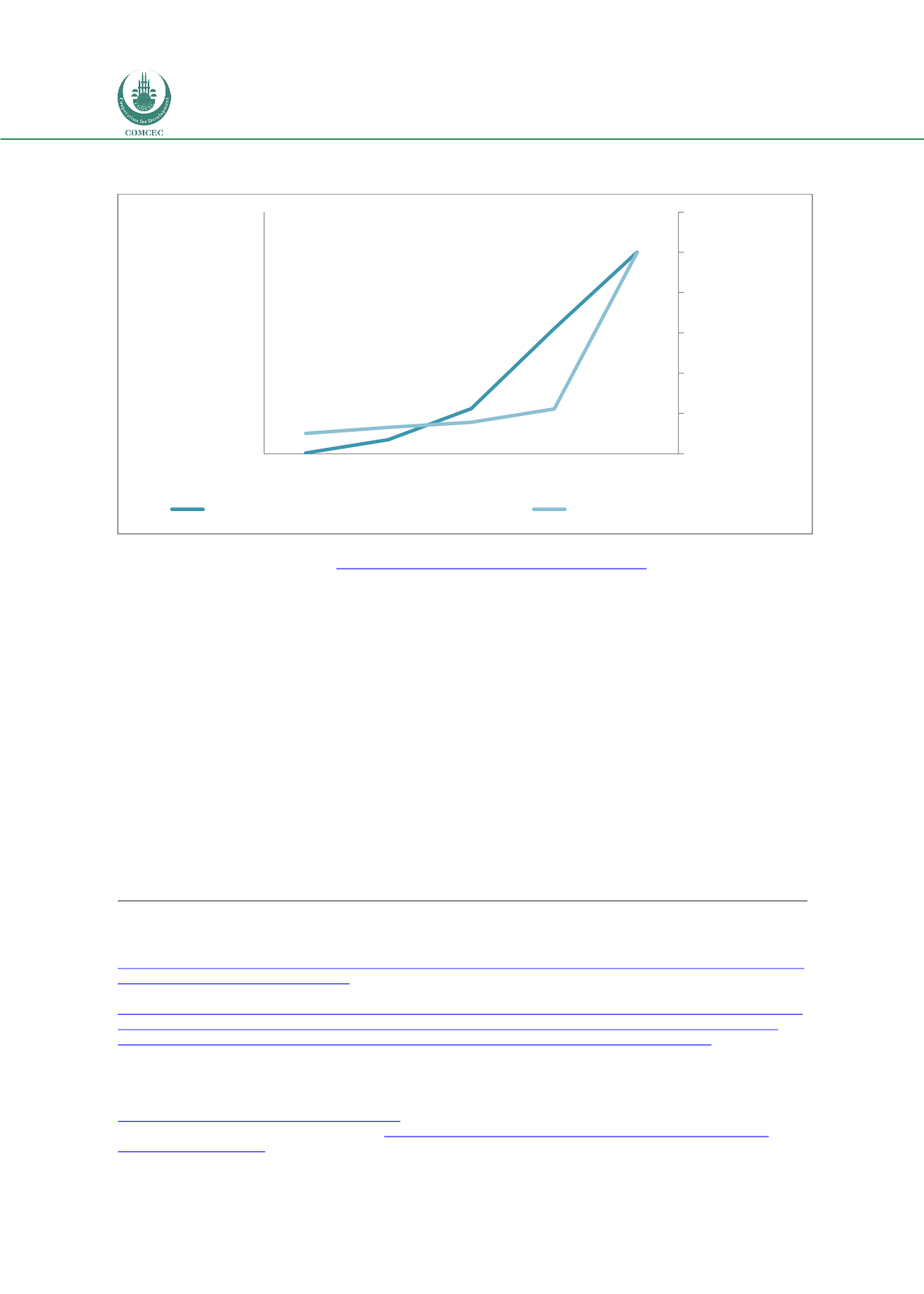

Forced Migration in the OIC Member Countries:
Policy Framework Adopted by Host Countries
70
Figure 9: Registered Syrian and non-Syrian asylum seekers and refugees, 2012–2016
Source: UN High Commissioner for Refugees (UNHCR), BM Mülteciler Yüksek Komiserliği (BMMYK), “Güncel
İstatistikler,” accessed May 5, 2016
, http://www.unhcr.org/turkey/home.php?page=12 .As Figure 9 illustrates, the numbers of registered Syrian and non-Syrian protected populations
have spiked since January 2014. This rapid increase can be traced to several causes. The
concerted efforts made by Turkish authorities to register the Syrian population residing
outside refugee camps since 2013 have substantially increased the number of Syrians
recorded by the government.
14
Simultaneously, the war in Syria intensified as a result of
bombing campaigns led by Syrian government and Russian forces; significant advances made
by ISIS in northern Syria in 2014 and 2015 thus drove masses of people across the Turkish
border.
15
The same conflict pushing Syrians into Turkey has driven rising numbers of Iraqis
across the border, particularly after ISIS captured Mosul in 2014.
16
Finally, increasing
numbers of Afghans joined flows into Turkey in 2015. These flows were the result of localized
conflicts between the central government and the Taliban that uprooted lives across the
country, and increasing pressure on Afghan refugees (some of whom had lived in exile for
decades) to leave the countries hosting them.
17
13
The total population under protection as of May 2016 was 3,014,746. In 2016, the total projected Turkish population is
78,965,645. Thus, protected populations at this time represent 3.7 percent of all people living in Turkey.
14
Kemal Kirişci,
Syrian Refugees and Turkey’s Challenges: Going Beyond Hospitality
(Washington, DC: Brookings, 2014), 17,
http://www.brookings.edu/~/media/research/files/reports/2014/05/12-turkey-syrian-refugees-kirisci/syrian-refugees- and-turkeys-challenges-may-14-2014.pdf ;Disaster and Emergency Management Presidency (AFAD),
Population Influx from
Syria to Turkey: Life in Turkey as a Syrian Guest
(Ankara: AFAD, 2014), 53,
https://www.google.com/url?sa=t&rct=j&q=&esrc=s&source=web&cd=1&cad=rja&uact=8&ved=0ahUKEwiEiaToyq_NAhX MPB4KHfVlC5QQFggcMAA&url=https%3A%2F%2Fwww.afad.gov.tr%2FDokuman%2FTR%2F148-20150202172457- 11549547929971633783.pdf&usg=AFQjCNHxSvNxr_a2K_pwkld-3Y7zscCPsw&bvm=bv.124272578,d.dmo .15
ISIS attacked Tel Abyad heavily in June 2015, ISIS began a large scale attack on Kobane in October 2014. See Kirişci and
Ferris,
Not Likely to Go Home,
4.
16
Kirişci and Ferris,
Not Likely to Go Home
.
17
BBC News
, “The reverse exodus of Pakistan’s Afghan refugees,”
BBC News
, August 28, 2016,
http://www.bbc.com/news/world-asia-37163857 ;Tahir Khan, “Government extends Afghan refugees’ stay until early
2017,”
The Express Tribune
, September 9, 2016
, http://tribune.com.pk/story/1179198/government-extends-afghan- refugees-stay-early-2017/ ;Strickland, “Why are Afghan refugees leaving Iran?”
Al Jazeera,
updated May 17, 2016..
0
50.000
100.000
150.000
200.000
250.000
300.000
0
500.000
1.000.000
1.500.000
2.000.000
2.500.000
3.000.000
2012
2013
2014
2015
2016
Registered Asylum Seekers and
Refugees with UNHCR Turkey
Syrians Registered under Temporary
Protection
Registered Temporary Protection Beneficiaries
Registered UNHCR Applicants
















